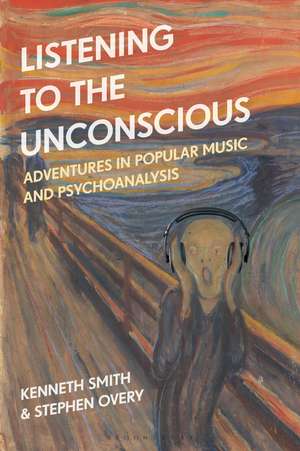Listening to the Unconscious: Adventures in Popular Music and Psychoanalysis
Autor Professor or Dr. Kenneth Smith, Dr. Stephen Overyen Limba Engleză Paperback – 22 feb 2023
| Toate formatele și edițiile | Preț | Express |
|---|---|---|
| Paperback (1) | 149.02 lei 3-5 săpt. | +30.18 lei 6-10 zile |
| Bloomsbury Publishing – 22 feb 2023 | 149.02 lei 3-5 săpt. | +30.18 lei 6-10 zile |
| Hardback (1) | 540.38 lei 6-8 săpt. | |
| Bloomsbury Publishing – 22 feb 2023 | 540.38 lei 6-8 săpt. |
Preț: 149.02 lei
Preț vechi: 160.51 lei
-7% Nou
Puncte Express: 224
Preț estimativ în valută:
28.51€ • 31.07$ • 24.03£
28.51€ • 31.07$ • 24.03£
Carte disponibilă
Livrare economică 02-16 aprilie
Livrare express 18-22 martie pentru 40.17 lei
Preluare comenzi: 021 569.72.76
Specificații
ISBN-13: 9781501368462
ISBN-10: 150136846X
Pagini: 280
Dimensiuni: 152 x 229 x 25 mm
Greutate: 0.45 kg
Editura: Bloomsbury Publishing
Colecția Bloomsbury Academic
Locul publicării:New York, United States
ISBN-10: 150136846X
Pagini: 280
Dimensiuni: 152 x 229 x 25 mm
Greutate: 0.45 kg
Editura: Bloomsbury Publishing
Colecția Bloomsbury Academic
Locul publicării:New York, United States
Caracteristici
The first book to explore the topic of popular music and philosophy with equal weight to both disciplines; author Kenneth Smith is a musicologist and Stephen Overy is a philosopher
Notă biografică
Kenneth Smith is Professor of music at the University of Liverpool, UK, and President of the Society for Music Analysis. He is the author of Skryabin, Philosophy and the Music of Desire (2017) and Desire in Chromatic Harmony (2020) and co-editor of The Routledge Companion to Popular Music Analysis (2018). Stephen Overy is Lecturer in philosophy at Newcastle University, UK. He specialises in philosophy of the unconscious and desire, situating the work of a line of thinkers from Kant to Deleuze in relation to its implications for materialism.
Cuprins
Introduction1. Charting Three Freudian Hypotheses with Pop Music: the economic, the topographic, the structural2. Freud, Music, and the Psychological Condition3. Bright Eyes (and friends) and the Antlers Meet Jacques Lacan4. Phallocentrism, Sexuation and the Chora, from Lacan to Kristeva; Gaga to Björk5. The Death Drive and Unconscious Production6. "Do you want to be the ebb of this great tide?" Lacan, Freud, Nietzsche, Deleuze, and "Joy in Repetition": Prince and LCD Soundsystem7. S & M, & Pop Perversion8. Polly Jean Harvey asks,"Is this desire [enough]?"BibliographyIndex
Recenzii
Exploring how conscious and unconscious states of mind are channeled through musical expression, Kenneth Smith and Stephen Overy collaborate here to offer post-Freudian and post-Lacanian readings of popular songs. With clear reference to psychoanalytic concepts, their analytic applications reveal remarkable ways in which states of being emerge through expressive musical strategies. Listening to the Unconscious will reward readers with persuasive and stimulating reflections on how music channels the very core of human experience.
Three particular values strike me in reading Smith and Overy's Listening to the Unconscious. First, they provide an entry-level, cogent introduction to key psychoanalytic concepts and the ways they enable navigation of the unconscious, but with a musical purpose in mind. Second, they give much all-too-rare attention to musical detail in the light of these concepts, leading to persuasive elucidations of a wide range of songs at rather greater depth than often found. And, third, they present sufficient richness of demonstration to enable interested readers to apply these ideas to music of their own choosing, and thus to understand music more convincingly from this useful perspective. What more could one want?
Listening to the Unconscious provides a compelling approach to music listening. It is an invaluable addition to the field of popular music studies, demonstrating deftly the relevance of psychoanalysis in music scholarship. Comprising an extensive collection of musical examples, Smith and Overy have developed an impressive array of theories that lay the foundations for important forms of critical thinking.
Kenneth Smith and Stephen Overy present a unique approach to the analysis of popular music that links conventional music theoretic and Freudian/Lacanian psychoanalytic concepts providing the analyst a window into the unconscious drives shaping popular music.
Three particular values strike me in reading Smith and Overy's Listening to the Unconscious. First, they provide an entry-level, cogent introduction to key psychoanalytic concepts and the ways they enable navigation of the unconscious, but with a musical purpose in mind. Second, they give much all-too-rare attention to musical detail in the light of these concepts, leading to persuasive elucidations of a wide range of songs at rather greater depth than often found. And, third, they present sufficient richness of demonstration to enable interested readers to apply these ideas to music of their own choosing, and thus to understand music more convincingly from this useful perspective. What more could one want?
Listening to the Unconscious provides a compelling approach to music listening. It is an invaluable addition to the field of popular music studies, demonstrating deftly the relevance of psychoanalysis in music scholarship. Comprising an extensive collection of musical examples, Smith and Overy have developed an impressive array of theories that lay the foundations for important forms of critical thinking.
Kenneth Smith and Stephen Overy present a unique approach to the analysis of popular music that links conventional music theoretic and Freudian/Lacanian psychoanalytic concepts providing the analyst a window into the unconscious drives shaping popular music.
